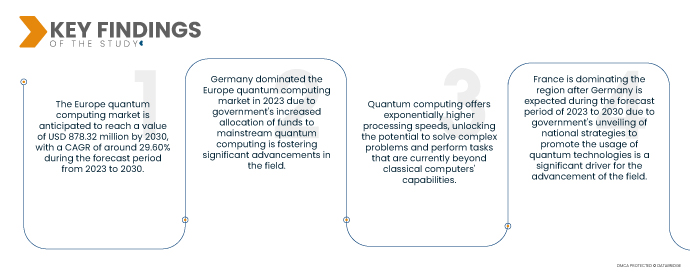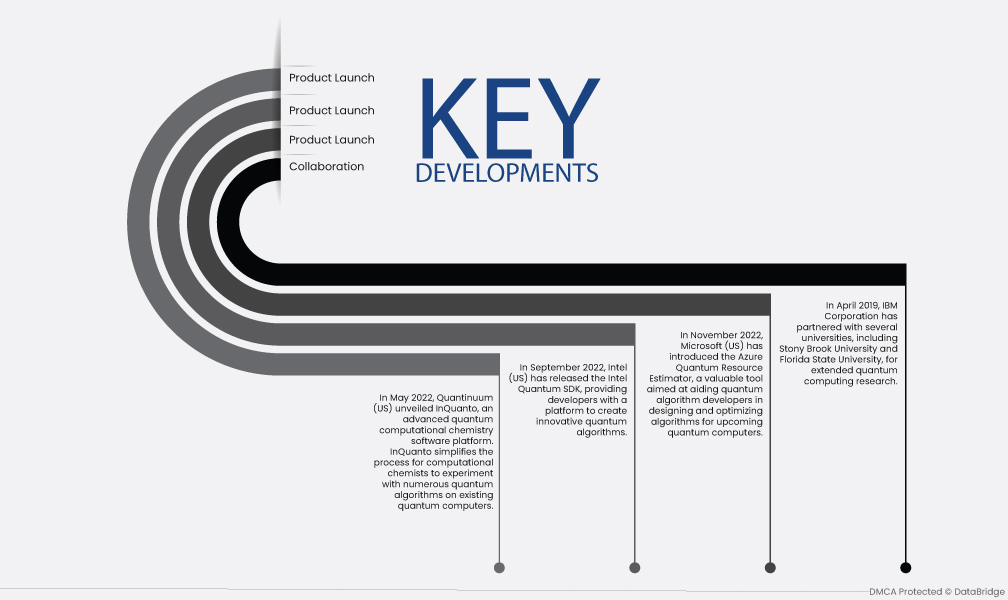量子コンピューティングの用途は、暗号化、最適化、材料科学、創薬など、さまざまな分野に及びます。主な特徴としては、量子ビット (キュービット) が複数の状態を同時に表すことができる重ね合わせや、キュービットを本質的に相互接続できるエンタングルメントなどがあります。これらの独自の特性により、量子コンピューターは従来のコンピューターよりも指数関数的に高速に複雑な問題に取り組むことができ、業界に革命をもたらし、科学、テクノロジー、その他さまざまな分野で画期的な進歩をもたらします。
完全なレポートにアクセスするには、 https://www.databridgemarketresearch.com/reports/europe-quantum-computing-market
データブリッジマーケットリサーチの分析によると、 欧州の量子コンピューティング市場 量子コンピューティング市場は、2022年に1億1,036万米ドルと評価され、2030年までに8億7,832万米ドルに達すると予想されており、2023年から2030年の予測期間中に29.60%のCAGRを記録します。量子ハードウェア、ソフトウェア、アルゴリズムの継続的な開発によりコンピューティング機能が向上し、研究者、業界、政府からの関心が高まり、市場の成長を促進します。
研究の主な結果
投資の増加が市場の成長率を押し上げると予想される
量子コンピューティング市場は、公共部門と民間部門の両方からの投資の増加により、急速な成長を遂げています。これらの多額の資金投入により、この分野の研究開発活動が推進され、量子ハードウェア、ソフトウェア、アルゴリズムの進歩が促進されています。その結果、量子コンピューティング技術の商業化が急速に進んでいます。これらの投資の支援により、企業や研究者は実用的かつ商業的に実現可能な量子コンピューティング ソリューションの実現に近づき、革命的なコンピューティング パワーの可能性を解き放ちつつあります。
レポートの範囲と市場セグメンテーション
|
レポートメトリック
|
詳細
|
|
予測期間
|
2023年から2030年
|
|
基準年
|
2022
|
|
歴史的な年
|
2021 (2015~2020年にカスタマイズ可能)
|
|
定量単位
|
売上高(百万米ドル)、販売数量(個数)、価格(米ドル)
|
|
対象セグメント
|
システム (単一量子ビット量子システム、複数量子ビットシステム)、量子ビット (トラップイオン量子ビット、半導体量子ビット、超伝導)、提供内容 (システム、サービス)、導入モデル (オンプレミス、クラウド)、コンポーネント (ハードウェア、ソフトウェア、サービス)、アプリケーション (暗号化、シミュレーション、並列処理、機械学習、アルゴリズム、その他)、論理ゲート (トフォリ ゲート、アダマール ゲート、パウリ ロジック ゲート、その他)、業種 (銀行および金融、ヘルスケアおよび製薬、防衛、自動車、化学、公益事業、その他)
|
|
対象国
|
ドイツ、フランス、イギリス、オランダ、スイス、ベルギー、ロシア、イタリア、スペイン、トルコ、その他のヨーロッパ諸国
|
|
対象となる市場プレーヤー
|
Honeywell International, Inc. (米国)、Accenture (アイルランド)、富士通 (日本)、Rigetti & Co, Inc. (米国)、1QB Information Technologies, Inc. (カナダ)、IonQ (米国)、Atom Computing, Inc. (米国)、ID Quantique (スイス)、QuintessenceLabs (オーストラリア)、Toshiba Research Europe Ltd. (英国)、Microsoft (米国)、Magiq Technologies, Inc. (米国)、NEC Corporation (日本)、Anyon System Inc. (カナダ)、CAMBRIDGE QUANTUM COMPUTING LTD (英国)、QCWare (米国)、Intel Corporation (米国)
|
|
レポートで取り上げられているデータポイント
|
データブリッジマーケットリサーチがまとめた市場レポートには、市場価値、成長率、セグメンテーション、地理的範囲、主要プレーヤーなどの市場シナリオに関する洞察に加えて、専門家による詳細な分析、患者の疫学、パイプライン分析、価格分析、規制枠組みも含まれています。
|
セグメント分析:
ヨーロッパの量子コンピューティング市場は、システム、量子ビット、提供、展開モデル、コンポーネント、アプリケーション、論理ゲート、および業種に基づいてセグメント化されています。
- システムに基づいて、ヨーロッパの量子コンピューティング市場は、単一量子ビット量子システムと複数量子ビットシステムに分類されます。
- 量子ビットに基づいて、ヨーロッパの量子コンピューティング市場は、トラップイオン量子ビット、半導体量子ビット、超伝導量子ビットに分類されます。
- 提供内容に基づいて、ヨーロッパの量子コンピューティング市場はシステムとサービスに分類されます。
- 展開モードに基づいて、ヨーロッパの量子コンピューティング市場はオンプレミスとクラウドに分類されます。
- コンポーネントに基づいて、ヨーロッパの量子コンピューティング市場は、ハードウェア、ソフトウェア、サービスに分類されます。
- アプリケーションに基づいて、ヨーロッパの量子コンピューティング市場は、暗号化、シミュレーション、並列処理、機械学習、アルゴリズム、その他に分類されます。
- 論理ゲートに基づいて、市場はトフォリ ゲート、アダマール ゲート、パウリ 論理ゲートなどに分類されます。
- 業種別に見ると、市場は銀行・金融、ヘルスケア・医薬品、防衛、自動車、 化学薬品、ユーティリティなど。
主要プレーヤー
データブリッジマーケットリサーチは、ヨーロッパの量子コンピューティング市場における主要なヨーロッパの量子コンピューティング市場プレーヤーとして、ハネウェルインターナショナル社(米国)、アクセンチュア社(アイルランド)、富士通社(日本)、リゲッティ社(米国)、1QBインフォメーションテクノロジーズ社(カナダ)を認定しています。
市場動向
- 2019 年 4 月、IBM コーポレーションは、量子コンピューティング研究の拡大に向けて、ストーニーブルック大学やフロリダ州立大学など、いくつかの大学と提携しました。さらに、東京大学、ノートルダム大学、バージニア工科大学とのコラボレーションにより、学生は研究プロジェクトや教育目的で IBM の量子コンピューティング システムを利用できるようになります。
- 2022年11月、マイクロソフト(米国)は、Azure Quantum Resource Estimatorを発表しました。これは、量子アルゴリズム開発者が今後の量子コンピューターのアルゴリズムを設計および最適化するのを支援することを目的とした貴重なツールです。このリソースエスティメーターを使用すると、開発者は必要な量子リソースをよりよく理解して推定できるため、将来の量子コンピューティングプラットフォームで実行されるより効率的で効果的なアルゴリズムを開発できます。
- 2022年9月、Intel(米国)は、革新的な量子アルゴリズムを作成するためのプラットフォームを開発者に提供するIntel Quantum SDKをリリースしました。SDKは、シミュレーションを使用してこれらのアルゴリズムの開発とテストを容易にし、量子ビットを実行するための将来の量子ハードウェアと互換性があるように設計されています。
- 2022年5月、Quantinuum(米国)は、高度な量子計算化学ソフトウェアプラットフォームであるInQuantoを発表しました。InQuantoは、計算化学者が既存の量子コンピューター上で多数の量子アルゴリズムを実験するプロセスを簡素化します。
地域分析
地理的に見ると、ヨーロッパの量子コンピューティング市場レポートでカバーされている国は、ドイツ、フランス、イギリス、オランダ、スイス、ベルギー、ロシア、イタリア、スペイン、トルコ、その他のヨーロッパ諸国です。
Data Bridge Market Research の分析によると:
ドイツは、 量子コンピューティング市場 予測期間2023年~2030年
2023年には、革新的なパートナーシップとリソース、人材、専門知識のプールを奨励する新興企業間のコラボレーションに対する政府のインセンティブにより、北米が量子コンピューティング市場を支配しました。この協力的なアプローチは、量子コンピューティングの開発を加速するだけでなく、新興企業が貴重なリソースと専門知識にアクセスできるようにし、最終的には量子コンピューティング業界の成長を促進し、社会全体に利益をもたらします。
2023年から2030年の予測期間中、フランスはドイツに次いで優位に立つ
2023年、フランスは量子技術の研究、開発、商業化を支援するための明確な目標と取り組みを概説した戦略により、大幅な成長を遂げると予想されています。量子技術を国家課題として優先することにより、政府はこの新興分野に資金、リソース、専門知識を向けています。この協調的な取り組みは、イノベーションと競争力を高めるだけでなく、さまざまな分野への量子技術の統合を加速し、国家規模での変革的な進歩と経済成長への道を開きます。
量子コンピューティング市場に関する詳細情報 レポートはこちらをクリックしてください – https://www.databridgemarketresearch.com/reports/europe-quantum-computing-market














